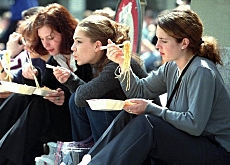
Eating habits put retailers under pressure

The Swiss have less time and money to spend on meals, forcing retailers to reconsider their marketing and sales strategies, according to a recent study.
Facing increased pressure at work, consumers would rather cut short their meals during the day and enjoy a more leisurely dinner in the evening.
The report, published by St Gallen University’s Institute of Marketing and Retailing, highlights the shifting eating habits of the Swiss. These changes have led to a more fragmented marketplace for suppliers and retailers.
“We have more and more situations where consumers like to eat something, in various places, on the go, especially for breakfast and lunch,” said Thomas Rudolph, a professor of retail management and co-author of the study.
A survey of nearly 1,000 shoppers showed that 80 per cent of people’s time is spent away from home. The number of those eating out is also increasing during the daytime.
Rudolph says this trend has become apparent in the past 20 years, with less than 40 per cent of consumers going home for a bite to eat.
“Who still has a lunch break for one-and-a-half hours? Many companies limit these breaks to 30 minutes.”
“The business climate means there is a lot of pressure within firms and this is influencing consumer behaviour,” he told swissinfo.
Nutrition
But for nutrition specialists, this lack of time for meals is not good news for consumers.
“Meals are more balanced and healthier if you have more time to pick and choose,” said Esther Infanger, a dietician at the Swiss Nutrition Society.
Significantly, Rudolph reckons managers have shown the way, choosing to eat at their desk rather than take lunch at a local restaurant. But Infanger warns against it.
“It’s not good to eat at your workplace because it gives you less time to eat and you pay less attention to the food,” she told swissinfo. “Some people also don’t realise that they have had enough to eat.”
With increasing pressure at the workplace, convenience foods have become more popular. Sales have increased even though these products have a reputation for being expensive and unhealthy.
Infanger is adamant that this does not mean people who buy convenience foods are making a mistake.
“A salad can be convenience food,” she added. “Healthy choice is possible, but it is also possible to select something with too many calories, so you have to consider the ingredients.”
Innovation
Rudolph believes that suppliers and retailers have to respond with innovations to increasing demand for convenience food.
“In the past, people went to a store to buy a variety of products before taking them home and preparing them,” he added. “But I think consumers are looking for faster solutions.”
One trend has seen more people take breakfast at a supermarket counter. Two years ago, it was less than one in ten of those surveyed; today, it’s nearly 17 per cent.
This reflects consumer desire for cheap food, according to the report. A quarter of those who answered the poll said cost was a factor when choosing a meal.
Rudolph says that retailers and suppliers aren’t really well equipped to deal with rapid change. “The market is moving so fast that it’s difficult for a big retailer to react in a convenient way for the consumer,” he added.
Suppliers are hampered as well by the fact that it is difficult to decide when to replace old products by new ones. With the market also becoming more fragmented, it has become difficult to decide where to best use limited marketing resources.
But it’s not just daytime eating habits that are changing. People are also choosing to have dinner at home in the evening rather than go out, the report said.
“For dinner, people want to take their time, cook for themselves and relax,” Rudolph said. “It could be they are also less prepared to spend money on a meal away from home.”
swissinfo, Scott Capper
17.7% of those surveyed for the Food consumption 2005 report said they ate lunch at the office (14.4% in 2003).
39.9% said they still went home at midday (43% in 2003).
16.4% ate breakfast away from home (9.8% in 2003).
Less than 20% said they were unsatisfied with convenience food.
71.9% prefer to eat their evening meal at home.
932 people were questioned for the report.

In compliance with the JTI standards
More: SWI swissinfo.ch certified by the Journalism Trust Initiative


























You can find an overview of ongoing debates with our journalists here . Please join us!
If you want to start a conversation about a topic raised in this article or want to report factual errors, email us at english@swissinfo.ch.